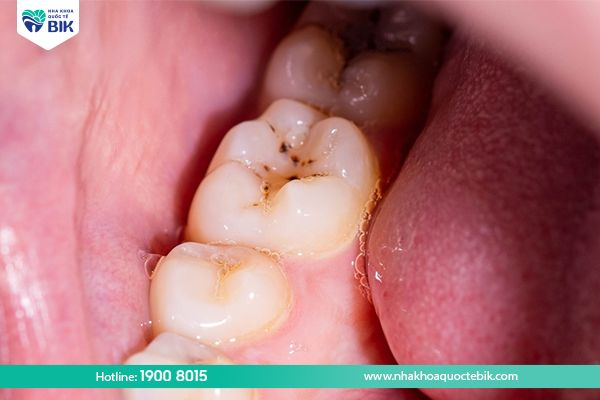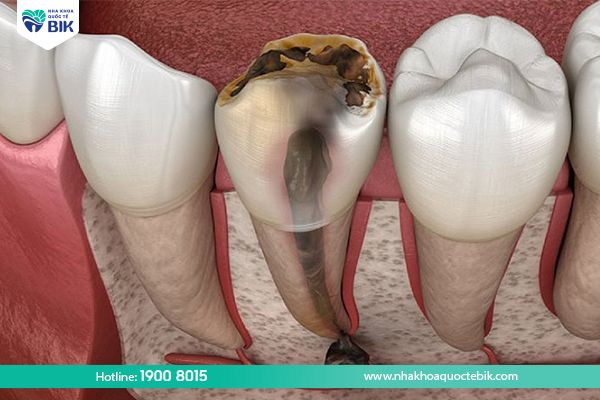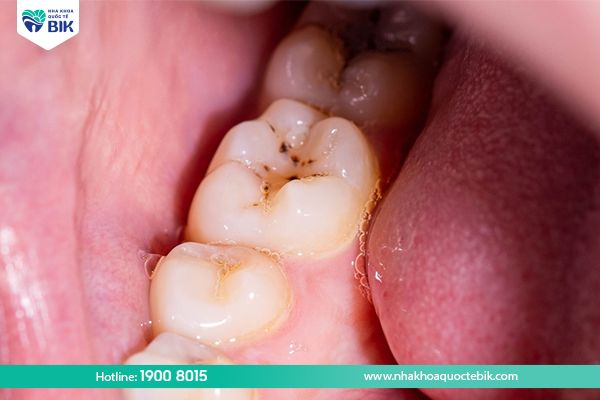Tooth decay is a very common disease today, which can occur at any age from children to the elderly. Tooth decay has many stages, usually when tooth extraction is indicated, it means that the tooth has decayed beyond treatment and is also at risk of affecting the adjacent teeth. Let’s find out with BIK International Dental Clinic whether tooth extraction is painful or not through the article below.
1. Things to know about tooth decay
Tooth decay is a condition in which the hard tissue of the tooth has been damaged by factors and the process of demineralization occurs, caused by bacteria residing in plaque, thereby forming small black holes on the tooth surface.
This is a common oral disease that can occur in almost any subject, especially children, adolescents and the elderly. If not treated promptly, it will affect the inner layers of the tooth, causing pain and discomfort, sometimes infection and you may even have to remove the decayed tooth to prevent it from spreading to the healthy teeth next to it.

To recognize the condition of tooth decay, you can rely on some of the following symptoms:
– Causing pain and discomfort to the teeth
– Brown or black streaks appear on the tooth surface
– When using foods that are too hot or cold, it can cause tooth sensitivity
– Breath may have an unpleasant odor
– When chewing, you will feel a bitter, strange taste in the mouth.
If you see the above signs in your oral health, you may have a problem with your oral health, specifically tooth decay. The signs of tooth decay not only affect your oral health and quality of life, but also cause loss of aesthetics if not treated promptly.
2. The effects of tooth decay on health
Tooth decay is a disease that develops very silently over time, so in the early stages, tooth decay is very difficult to detect because it does not cause any discomfort to the patient, so people often do not pay attention. In this first stage, you can treat tooth decay with home remedies, but if the decay persists, it can cause extremely serious complications for your oral health.
2.1. Tooth decay causes gingivitis, periodontitis
The bacteria that cause tooth decay attack the layers of the tooth from the outside in, they spread and cause swelling of the gums. Patients will feel pain during chewing or brushing their teeth, and their gums may even bleed. In addition, the oral cavity often has an unpleasant odor, causing a loss of confidence when communicating.
If the above condition is not treated promptly, it can cause gum recession and affect the structure of the teeth. When gingivitis occurs, doctors will often prescribe antibiotics to fight infection, along with scaling and cleaning the oral cavity to limit the spread of bacteria.

2.2. Tooth decay leads to pulpitis, broken teeth
Tooth decay can damage the tooth structure, causing chipped, cracked, weakened, loose teeth and eventually permanent tooth loss. Tooth decay bacteria will attack the pulp causing severe pain, leading to tooth sensitivity and constant pain. This will greatly affect the patient’s daily eating and health.

2.3. Tooth decay causes periodontitis
If tooth decay progresses for too long without being treated promptly, bacteria will grow strongly and lead to inflammation of the periodontal ligament. At this time, the gums will ache severely, pus will appear between the teeth and gums, and the tooth root will begin to show signs of loosening.
The above condition is extremely serious, can cause pain all the way to the head, high fever and affect the health of the whole body. The maxillary sinus related to the decayed tooth area can also be infected and swollen and painful.
2.4. Tooth decay causes headaches
When tooth decay is not treated promptly, it can affect the nervous system, causing headaches.
When the patient feels a headache, it means that the dental pulp has been seriously affected. At night, they often appear more frequently, seriously affecting the patient’s sleep. Not getting enough sleep will make the patient’s psychology more susceptible to changes, discomfort, sensitivity, and affect the body’s health.

3. When do cavities need to be extracted?
Because it is an extremely common disease, many people are still subjective when they know they have the above problem. If a severely decayed tooth is not extracted, it will lead to difficulty in chewing, prolonged pain and can cause oral infections at many levels such as tooth abscess, gingivitis, etc.
The first thing to do is to go to a reputable dental facility immediately to be examined by a specialist in a timely manner. Whether or not to extract a decayed tooth will depend on the severity of the tooth decay.
If the tooth is only in a mild state of decay, which is also the first level of decay, a few dentin spots will appear on the tooth surface but will not cause any uncomfortable pain. At this time, the doctor may prescribe remineralization of the decayed tooth or tooth filling depending on the severity of the tooth decay. The above methods will be able to prevent the development of cavities, however, the patient still needs to follow the oral care regimen as instructed by the doctor.
When a tooth has severe decay, causing pulp death and is at risk of affecting healthy teeth next to it, and cannot be treated anymore, doctors will prescribe tooth extraction. In cases where the decayed tooth shows signs of swollen gums, it is necessary to treat the pain and swelling with internal medicine before proceeding with tooth extraction.

4. Does tooth extraction hurt?
When a decayed tooth is prescribed, it means that the patient has very severe decay and is experiencing severe pain caused by tooth decay. However, patients can be completely assured that the entire process of tooth extraction will not cause any pain.
Because before treating tooth decay, root canal treatment or tooth removal, the patient will be injected with anesthetic by the doctor. Therefore, the gum areas around the decayed tooth that needs to be extracted have been paralyzed, temporarily losing sensation, so if the patient feels pain, it may be due to insufficient anesthetic dose or psychological pain.
After a few hours, the anesthetic will wear off, at this time the tooth has been extracted, the body may begin to feel pain in the area where the decayed tooth was extracted. The level of pain will vary depending on the endurance and constitution of each person. Some people will not feel any pain or discomfort, but others will feel a lot of pain. However, the pain will soon subside after taking pain relievers as prescribed by the doctor and will stop after 4 to 5 days.
If the patient feels pain that lasts for many days without stopping, they should go to a dental facility for examination and timely treatment to prevent possible complications.

So whether tooth extraction is painful in reality depends on many different factors, but the doctor’s skills can be considered the most important factor affecting the patient’s pain during and after tooth extraction. Therefore, to ensure that the tooth extraction process is smooth, safe and painless, you can choose BIK International Dental Clinic as the place to have tooth extraction with a team of doctors with more than 10 years of experience in the profession.


















